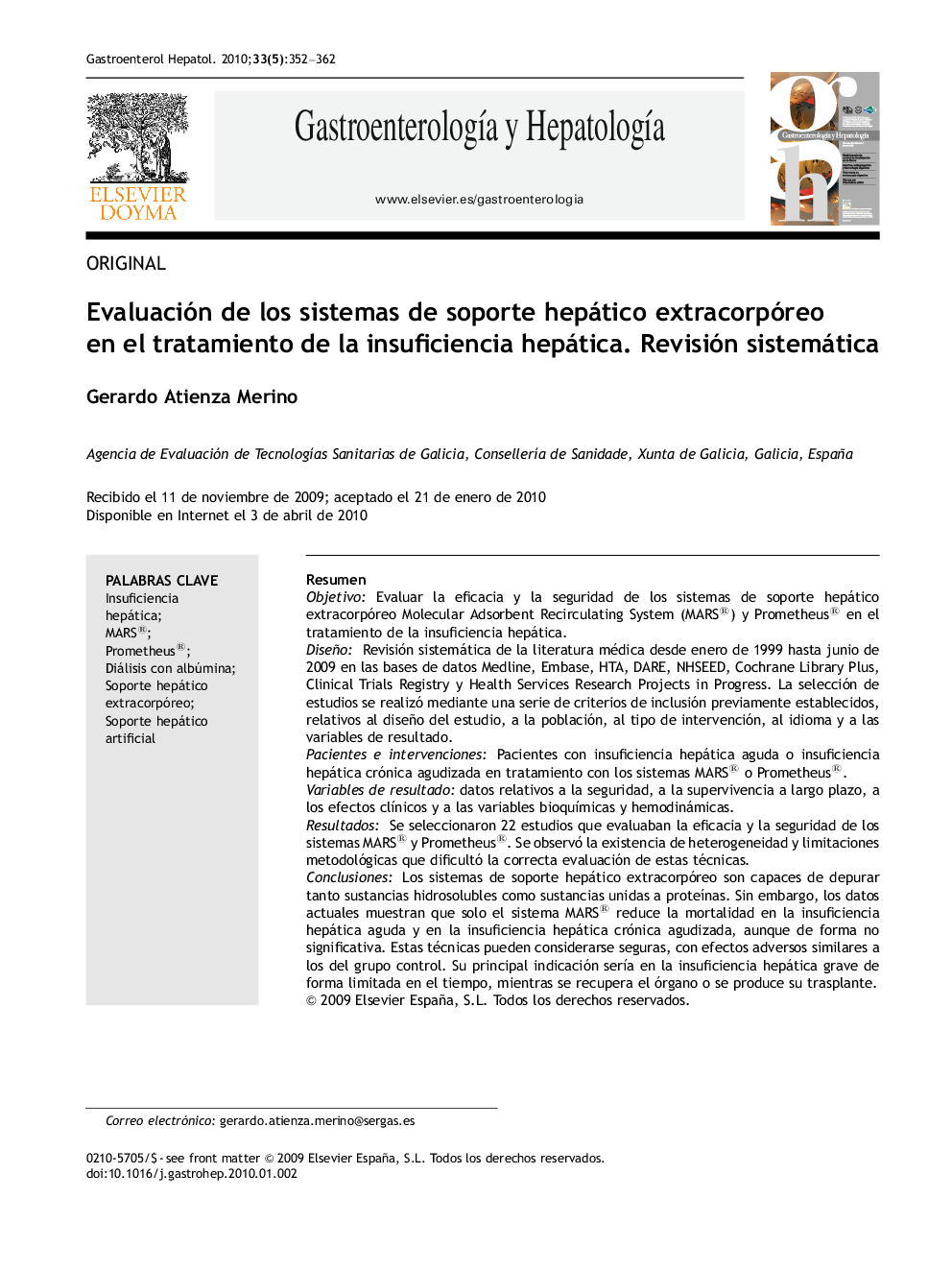| Article ID | Journal | Published Year | Pages | File Type |
|---|---|---|---|---|
| 3288321 | Gastroenterología y Hepatología | 2010 | 11 Pages |
ResumenObjetivoEvaluar la eficacia y la seguridad de los sistemas de soporte hepático extracorpóreo Molecular Adsorbent Recirculating System (MARS®) y Prometheus® en el tratamiento de la insuficiencia hepática.DiseñoRevisión sistemática de la literatura médica desde enero de 1999 hasta junio de 2009 en las bases de datos Medline, Embase, HTA, DARE, NHSEED, Cochrane Library Plus, Clinical Trials Registry y Health Services Research Projects in Progress. La selección de estudios se realizó mediante una serie de criterios de inclusión previamente establecidos, relativos al diseño del estudio, a la población, al tipo de intervención, al idioma y a las variables de resultado.Pacientes e intervencionesPacientes con insuficiencia hepática aguda o insuficiencia hepática crónica agudizada en tratamiento con los sistemas MARS® o Prometheus®.Variables de resultado: datos relativos a la seguridad, a la supervivencia a largo plazo, a los efectos clínicos y a las variables bioquímicas y hemodinámicas.ResultadosSe seleccionaron 22 estudios que evaluaban la eficacia y la seguridad de los sistemas MARS® y Prometheus®. Se observó la existencia de heterogeneidad y limitaciones metodológicas que dificultó la correcta evaluación de estas técnicas.ConclusionesLos sistemas de soporte hepático extracorpóreo son capaces de depurar tanto sustancias hidrosolubles como sustancias unidas a proteínas. Sin embargo, los datos actuales muestran que solo el sistema MARS® reduce la mortalidad en la insuficiencia hepática aguda y en la insuficiencia hepática crónica agudizada, aunque de forma no significativa. Estas técnicas pueden considerarse seguras, con efectos adversos similares a los del grupo control. Su principal indicación sería en la insuficiencia hepática grave de forma limitada en el tiempo, mientras se recupera el órgano o se produce su trasplante.
ObjectiveTo evaluate the safety and efficacy of the MARS® and Prometheus® extracorporeal liver support systems in the treatment of liver failure.DesignWe performed a systematic review of the literature from January 1999 to June 2009 in the Medline, Embase, HTA, DARE, NHSEED, Cochrane Library Plus, Clinical Trials Registry and HSRPROJ databases. Study selection was based on a series of previously established inclusion criteria related to the study design, population, type of intervention, language, and outcome measures.Patients and interventionsPatients with acute liver failure or acute exacerbations of chronic liver failure treated with the MARS® or Prometheus® systems. Outcome measures: data on safety, long-term survival, clinical effects and biochemical and hemodynamic variables.ResultsWe selected 22 studies evaluating the safety and efficacy of the MARS® and Prometheus® systems. Adequate evaluation of these techniques was hampered by the heterogeneity of the studies and their methodological limitations.ConclusionsExtracorporeal liver support systems are able to purify both hydrosoluble and protein-bound substances. However, current data show that only the MARS® system reduces mortality in acute liver failure and in acute exacerbations of chronic liver failure, although this reduction is non-significant. These techniques can be considered safe, with adverse effects similar to those of the control group. Their main indication is severe liver failure, for short periods while the liver recovers or a liver transplant becomes available.
